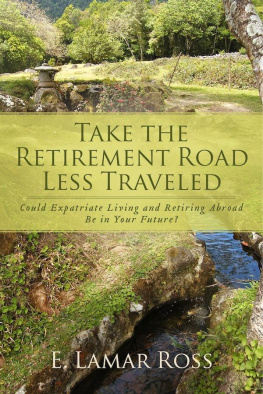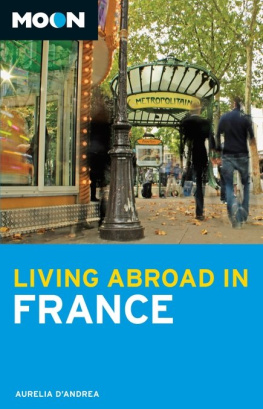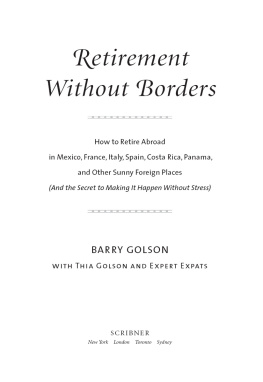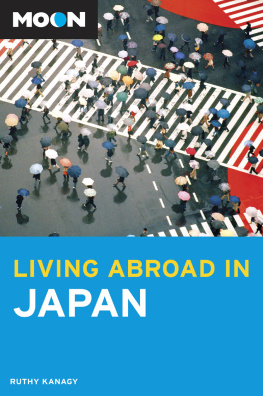We are all on a road to somewhere. In most cases it is a predefined, unconsciously chosen road based on decisions we made earlier in life. Most of us follow a path based on circumstances related to these earlier decisions.
Every decision we make in life precludes making certain other decisions; that is, some decisions are mutually exclusive. Your choice of life partner, choice of career, or educational degree limits but does not determine your future choices. This does not mean that you can not take another path; it simply means that you will have to make a conscious effort to do so. Setting out on a different path requires leaving the path you are on and setting off in a new direction.
I hope that the information I present in this book will prod many retirees to consider a path different from the average person --that of retiring to another country, expatriate living.
Coming from Latin ex (out of) and patria (country, the term expatriate applies to any individual who lives in a country or culture different from his native birth country or country of citizenship. The word expatriate equates in this book to residence, not citizenship. This residence can either be temporary or permanent.
The term expatriate is likewise used to refer to someone who has relinquished his or her citizenship to their country of birth, but is not used here in that sense.
It is estimated presently that there are over 6.5 million Americans living abroad, and the number is significantly increasing each year. Probably, by the time you are reading this, this information will already be outdated. If you have ever thought about moving to another country to live, this book is for you.
Over the last two generations or so, the population of the United States has become more and more mobile. Corporate transfers from state to state or even from one side of the country to the other have become quite common. Some individuals have even been transferred overseas. More than in the past, career advancement today frequently involves geographically relocating or at least considering the possibility of relocation.
When I was teaching in the university during my academic career, I found that in order to get a promotion or even an increase in pay, I most frequently had to change locations. It was much easier to progress in my career by relocating than it was to simply wait on a promotion within the university in which I was teaching at the time. I was able to progress in my career faster by making these moves. The working environment and the need to have more mobility today includes a larger geographical area.
Today the world has gotten smaller, largely due to advanced means of communication like the internet. Where I would have moved from state to state within the United States; others are now moving from country to country. Some have even become perpetual expatriate travelers, constantly moving from country to country.
The two major reasons for moving abroad are: (1) to work abroad, or (2) to retire abroad.
- Working Abroad. With the expanding interdependence of world economics, it has become easier and easier to find international business opportunities. Developing nations are looking for skills that either are not yet available among their own population, or due to cultural reasons, are not considered desirable positions. For example, the country of Panama needs contractors who are willing to build housing for lower socio-economic citizens. Even though the government is pushing programs to build this type of housing, few local contractors are taking advantage of this market. Those who are building for the expatriate population in the upper price ranges consider it beneath their dignity to build the less expensive houses. It might effect their image. So, the housing shortage continues.
- Retiring Abroad. Retirees from the United States and many European nations are now looking at retiring to a location less expensive than their home country. Couple this motivation with those individuals who move for a new lifestyle, adventure, better weather, and a perpetual vacation (good goal; harder to accomplish), and you have a large developing number of prospective expatriates. Countries like Belize and Panama have recognized this opportunity and have designed specific retiree programs with a multitude of benefits for expatriates. If you are interested in retiring abroad, such programs can not be beaten. Check them out.
If you have a personality that craves change, living abroad is definitely for you. If you want a shorter change of environment, living abroad is also a good choice. Whether it is a new job, job transfer, long term vacation, or permanent residency you desire, living abroad has much to offer you.
Some people have trouble adapting to any new experience. Others arent happy unless they are living on the edge. For those thinking of taking the plunge and moving abroad, your reaction to new experiences might be a good indicator of your chances of successfully making the move.
As a youth growing up in the provincialism (no negative connotation intended) of North Georgia, my experiences were not exactly international. My foreign experiences were largely from National Geographic articles. That magazine fascinated me and the seeds of foreign adventure were sown. In fact, until I was in my late teens, my only contact with "foreigners" was a Mexican photographer who came through town once a year. I still have a picture of me and two of my brothers seated on top of his donkey, his only photographic prop.
The high school French teacher tried to get me to take French. I took typing instead!
I did get interested in Spanish and started studying the language on my own with language record sets. I was hooked. Within two years, I had started college, begun formally studying Spanish, and spent my first college summer living with friends in Mexico.
That summer should have been out of my comfort zone, but that first night in a Mexican border town, seated at a table in an outdoor restaurant in front of the bullring listening to Mariachi music stirred up a curiosity that has never gone away. I still almost become teary-eyed when I hear that type of Mexican music. Some of my happiest moments are when I am in a totally alien environment.
I daily meet people who tell me they could never live outside the United States. They could be right. Persons who have spent their entire life fearing the unknown, happy to live in the same town, working in the same job, and never traveling out of a three state area might have trouble adapting to expatriate living. There is nothing wrong with being this way, but it could be a good indicator that you would have difficulty adapting to life in a country with a new language, uncertain routine, and a cultural tradition totally different from your own.
For most people however, adaptation to living abroad as an expatriate is not only possible, but a challenging experience. If you live your life looking for physical, intellectual, or economic challenges, you would probably enjoy the acclimatization process as you adapt to a new culture. You, like others before you, would probably experience the same initial cultural frustrations, and have to work your way through the cultural shock process. But even that is exciting.
If you are reading this because you have an interest in possibly living abroad, you probably have what it takes to do so. Take the plunge by taking short trips abroad to your countries of interest. Your reaction to your own experiences will tell you if you are ready or not.
"There never seems to be enough money at the end of the month". How many times have you heard someone make that statement? In fact, how many times have you said it yourself? At some time in our life we probably have all made that statement. For retirees, it is a very real problem. In fact, the number one fear among retirees is not the balance at the end of each month, but whether they will outlive their retirement income. They are always looking for a way to spend less and maintain what they have accumulated for as long as they can. One option for accomplishing their goals is retiring abroad.
Next page






